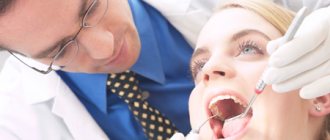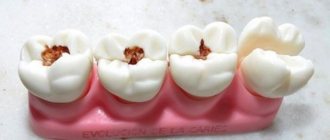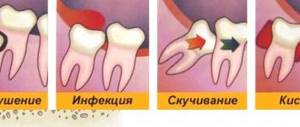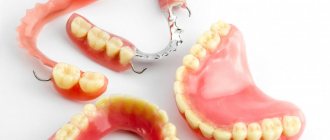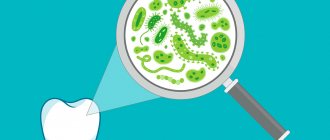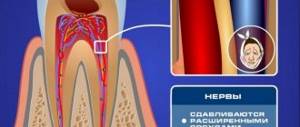Content:
- Pregnancy and wisdom teeth - how to recognize the process of active growth
- Pericoronitis - complication 2.1. Classification of pathology
- What can an expectant mother do on her own?
- Removal
- What you should never do
- Competent treatment
- Rehabilitation after surgery
It happens that wisdom teeth begin to actively grow during pregnancy .
This is due to the fact that “eights” are cut later than other units. The process of their active growth can be triggered by hormonal and metabolic changes that occur in a woman’s body during pregnancy. The process of the appearance of eighth units in itself cannot be called negative - it is a variant of the norm.
But for many expectant mothers it occurs with complications. It was also not uncommon for units to stand at the wrong angle and put extreme pressure on their “neighbors.” And this is an indication for emergency removal.
Causes
The period of eruption of the figure eight often brings a lot of pain and passes with exacerbations. Pain occurs as a result of the passage of bone tissue through the dense mucous membrane of the upper or lower jaw. In medicine, difficult tooth eruption processes are called pericoronitis. As it develops, the hood on the wisdom tooth becomes inflamed.
The eruption of wisdom teeth is a painful process, and during pregnancy it is even more acute.
But severe toothache that requires surgery is extremely rare. This process lasts more than one month, and most often does not cause severe discomfort. But during pregnancy, the chance of experiencing severe pain increases several times. Read more information about wisdom tooth growth during pregnancy in this material.
What causes this? It's all about altered hormonal levels. It begins to work in emergency mode, which additionally stimulates the intensive development of eights. As a result, bone tissue can grow in the wrong direction, intensively pushing neighboring teeth away, and the inflamed mucous membrane in response blocks the passage of the tooth and prevents it from erupting. In this case, pain, loss of strength and fever are observed.
Pericoronitis while expecting a child is an indication for surgical intervention. Otherwise, the woman may experience suppuration or cyst formation.
Another common cause of pain in the eights is their damage. Bone tissue is located in a hard-to-reach area and is often not properly cleaned or cared for. This causes rapid development of decay, and since it is irrational to treat the tooth, it can be removed.
Pregnancy and wisdom teeth - how to recognize the process of active growth
The symptoms that occur in pregnant women when the bone tissue above the figure eight “gives way” often differ from the classic picture. First, the woman notes that she began to get tired faster. Her performance decreases and her body temperature rises. In this case, the condition of the gums in the first days of symptoms may not change in any way.
Only after a few days (and sometimes weeks) it becomes clear that all the ailments are associated with teething. Signs characteristic of the situation are:
- pain when feeling the inflamed gum;
- acquisition of a red-blue hue by the mucous membranes located in the eruption zone;
- involuntary cheek twitching;
- enlarged and painful lymph nodes;
- the appearance of bad breath (it is not possible to get rid of it using standard hygiene products);
- hoarseness of voice;
- discomfort or throbbing pain in the ear on the causative side;
- painful sensations when chewing food, swallowing saliva, liquids.
If the first symptoms of the eruption of “eights” appear, it is important for the pregnant woman to calm down and not panic. It is quite possible that the emergence of new units will not be associated with any problems. But if the pain becomes severe, you should definitely get a dental consultation.
Consumer Reviews
WalkingEmotion about Asepta Active mouth rinse (irecommend.ru):
“Hello everyone) I have been seeing and treating my teeth with the same doctors in a private clinic for 10 years now. And I am very familiar with the Asepta brand, since it is the brand that has a therapeutic and prophylactic effect and is popular in the field of use for gum inflammation. The products are not the cheapest, but they are effective.
In addition to the paste, rinse and balm, I also take vitamins from this brand. But that's not all. Since my gums were inflamed, I was given an appointment with a periodontist, where I received Traumeel injections every day.
I like the packaging design of this brand. Although, of course, the main thing is the result, and not the beautiful shell...
...The tube is made of durable, aqua-colored plastic. But the substance itself has a colorless tint. The kit includes a measuring cup. For one rinse, 10 ml is enough.
I was recommended to rinse 10 ml twice a day after brushing my teeth with Asepta toothpaste. Duration of admission: 10 days.
You need to rinse for about 20 seconds and then do not eat or drink anything for half an hour. Therefore, it is better to do such procedures after eating.
The taste is minty-menthol, it still remains in the mouth for some time after use. It doesn’t turn me off, but on the contrary, you feel clean and fresh.
The product consumes quickly. There is an effect, although it manifests itself together with the use of other preventive agents. Will I buy it again? Yes. Thank you all for your attention to the review!)
lyudikt (otzovik.com):
“Good day, friends and readers of the review site! I want to write about one miracle mouth rinse - ASEPTA Activ. If you come across one, be sure to try this mouthwash. I highly recommend it. Firstly, it not only rinses the oral cavity itself, but also treats the gums, and therefore freshens breath. The effect is very, very good.
When I put this mouthwash into my mouth for the first time, it seemed to me that my mouth was just being “cleaned”. You need to rinse for twenty to thirty seconds; the first time, use just a little to maintain the required time. If you take too much, you simply won’t hold it for the right amount of time and will only “translate the product” and not feel the effect, but if you keep it for the right amount of time, then after rinsing you will feel freshness in your mouth for a long time.
According to the manufacturer itself, this is a remedy for accelerating the relief of signs of mouth inflammation, which contains benzydamine (pain reliever) and chlorhexedine (a broad-spectrum antiseptic).
As the manufacturer himself writes, it is not recommended to use it constantly; it should be used in courses of five to seven days, 2 to 3 times a day.
After use, you feel freshness and the feeling that there is not a single bacteria or parasite in your mouth.
I recommend trying this mouthwash for those who have problems with the oral cavity, it seems to eliminate them and smells so pleasant in the mouth.
The only drawback of this rinse is that it is only 150 ml in a bottle, but if you consider that you only need to use it for 5-7 days and then take a break, then it becomes clear that this is not a drawback, but on the contrary.”
Pericoronitis - a complication
Pericoronitis (pericoronitis) is a condition in which the soft tissues surrounding an erupting tooth become severely inflamed. Very often, this diagnosis is made to patients who have begun to see “figure eights” in their mouths. It is characterized by symptoms:
- sore gums;
- swelling;
- specific taste in the mouth.
For pericoronitis, surgery is most often indicated. During this procedure, the doctor excises the “hood” covering the unit to facilitate its eruption. Also, with this complication, there is sometimes a need for removal.
Classification of pathology
Pericoronitis is classified into:
- serous;
- purulent.
The disease always develops from the serous form. This is its initial stage. A large amount of serous fluid accumulates in the mucous tissues. Pain occurs when palpating the affected area.
If a woman does not go to the dentist on time, the serous form turns into a more dangerous one - purulent. Then the swelling becomes even stronger, and the body temperature periodically rises. A “hood” begins to cover the bone tissue, under which there is a large amount of pus.
The purulent form is treated exclusively surgically . After opening the “fistula,” the tissues are washed and the patient is prescribed antibiotics. Considering that such manipulations are extremely undesirable during the period of bearing a child, it is important not to start the disease and consult a doctor at the first sign of it.
The best treatment is to see a doctor
If after all the manipulations the pain does not go away, but only intensifies, swelling appears and the temperature rises, you should immediately consult a doctor.
Sources:
- https://cyberleninka.ru/article/v/kompleksnoe-lechenie-hronicheskogo-retsidiviruyuschego-aftoznogo-stomatita-s-ispolzovaniem-preparatov-lineyki-asepta Balashova L.V., Barakov M.A., Khaikin M.B. The use of "Asept" in the treatment of periodontal tissue diseases, bulletin of the medical institute "REAVIZ"
- Report on clinical trials to determine/confirm the preventive properties of commercially produced personal oral hygiene products: mouth rinse "ASEPTA PARODONTAL" - Solution for irrigator." Doctor of Medical Sciences Professor, Honored Doctor of the Russian Federation, Head. Department of Preventive Dentistry S.B. Ulitovsky, doctor-researcher A.A. Leontiev First St. Petersburg State Medical University named after academician I.P. Pavlova, Department of Preventive Dentistry.
- Report on clinical trials of anti-inflammatory balm for gums "Asepta" adhesive, St. Petersburg State Medical University, 2007
What can an expectant mother do on her own?
Pregnant women should not self-medicate. But, if the eruption of wisdom teeth proceeds according to the classic scenario and does not cause negative symptoms, the woman can calm down. In this case, she does not need to run to the dentist.
To eliminate the occurrence of unpleasant sensations associated with putting pressure on the inflamed gum, you must try to chew food on the “healthy side”. After eating, be sure to rinse your mouth with warm water or a decoction of herbs. It is also permissible to purchase a special pharmacy rinse for this purpose.
If the pain intensifies, medical consultation is indicated. If for some reason it is impossible to get it right now, the expectant mother can take a no-shpa tablet to reduce the pain. But this should be a one-time “action”.
Symptoms that many patients feel:
· Sore gums. This happens because the sharp edges of the coronal part press on the mucous membrane, causing irritation. If the tooth grows without complications, the pain will be dull and tolerable. But if the negative sensations are strong and constant, then we are talking about the development of an inflammatory process, and in this case it is necessary to urgently visit a doctor;
- Swelling and heaviness.
This is a complication in which the gum hangs over part of an already erupted tooth;
- Fever without signs of a cold
– this is a serious symptom that indicates that the process is complicated and the help of a doctor is needed;
- Heaviness in the chewing muscles
, which complicates the opening and closing of the oral cavity;
- Pain when swallowing indicates the development of a purulent abscess.
Removal
As practice shows, only in 5% of cases pregnant women have to pull out the “eight”. In other situations, it is possible to do without deletion. Extraction is permissible only if there are strict indications, including:
- inability to relieve severe pain using available painkillers;
- frequent recurrence of pericoronitis;
- the formation of an abscess affecting the facial nerve;
- destruction and suppuration of bone tissue;
- the formation of a hollow tumor on the bone in the figure eight area.
In all these cases, the woman is scheduled for dental surgery. Anesthesia is selected taking into account the duration of pregnancy and existing concomitant diseases. However, earlier than in the second trimester, extraction is contraindicated.
Medicines for toothache during pregnancy
If “grandmother’s” methods turned out to be powerless or if you don’t have any of the above remedies at home, we recommend turning to relatively safe medications for toothache during pregnancy. You should not endure pain, but before using medications it would be a good idea to consult a doctor (at least by phone).
So, medications for toothache allowed during pregnancy include:
- No-shpa or Drotaverine. These are different names for the same drug. The product quite effectively eliminates stomach and intestinal spasms, as well as headaches and toothaches.
- Grippostad. This medicine is intended to combat colds, but it also helps with toothache. It is contraindicated in the first trimester of pregnancy.
- Paracetamol. Take the whole tablet.
- Tempalgin and Pentalgin. To eliminate toothache, half a tablet of any of these drugs is enough.
- Children's gels for toothache. As a remedy for toothache during pregnancy, it makes sense to use gels designed for less painful teething in young children: Kalgel, Dentol-baby, Kamistad. They dull pain, pleasantly cool the painful area and fight inflammation.
- Ketanova. One tablet of this drug can be taken if the toothache becomes too severe.
What you should never do
A pregnant woman is strictly prohibited from doing the following things, as they can lead to malformations of the fetus:
- Take analgesics without a doctor's prescription. All drugs of this pharmacological group have many side effects.
- Apply painkillers to the inflamed gum. Such advice is available on the Internet, but you cannot follow it. Such compresses increase inflammation and create conditions for the formation of ulcers. In addition, the active compounds of the medications used will be absorbed into the systemic bloodstream and negatively affect the health of the fetus.
- Warm the affected area. Heat increases local blood circulation and helps the purulent tumor grow faster.
Self-medication during pregnancy is unacceptable. This is important for all women in an “interesting” position to understand.
Folk remedies for toothache during pregnancy
Since it is important for a pregnant woman to take care of the safety of the unborn child, it is mainly worth paying attention to folk remedies for toothache during pregnancy. These include:
- Gargling with herbal decoctions and infusions. To prepare such a decoction, you can use chamomile, plantain, calendula, sage or St. John's wort. If you don’t have herbs at home, you can prepare a regular saline solution. Rinsing should be done as often as possible. It is advisable to warm up a small amount of decoction before use. It is prohibited to rinse your mouth with infusion from the refrigerator: this will not only increase the pain, but can also provoke the development of inflammation.
- "Star". Universal balm “Zvezdochka” is an excellent folk remedy for toothache during pregnancy. A small cotton swab is soaked in vegetable oil (sunflower or olive), after which a little “Star” is applied to its end. The tampon is pressed against the gum (the root of the diseased tooth).
- Clove powder. If you have a powdered version of this spice at home, just sprinkle cloves on the inflamed area of the gum so that the pain begins to subside.
- Garlic. There are 2 ways to use garlic for toothache. The first method involves applying a piece of garlic directly to the sore gum. In the second option, it is recommended to crush a clove of garlic, turning it into a paste, and then apply a little of this substance to the wrist (where the veins stand out). If toothache is noted on the left, the paste is applied to the right wrist; when the pain is felt on the right - to the left.
- Plantain. This effective folk remedy for toothache during pregnancy is applicable only in the summer, when you can find fresh plantain on the street. A small leaf of this plant must be thoroughly washed and then rolled with a rolling pin or gently beaten with a hammer until the juice is released. When the sheet becomes soft and moist, it must be rolled into a thin tube and placed in the ear on the side of the diseased tooth. Surprisingly, the pain will soon begin to subside.
- House plants. In the fight against toothache, such common plants as aloe, kalanchoe and pelargonium are quite effective. A small piece of a leaf from any of these plants is peeled to extract the juice, and then pressed onto the diseased area.
- "Tooth drops." This drug is sold in pharmacies, but it is based only on natural substances: in its composition you will find valerian, camphor and mint oil. If a piece of cotton wool soaked in this solution is applied to a sore tooth, the pain will gradually subside. At the same time, “Tooth drops” are an excellent antiseptic and sedative.
Competent treatment
Doctors can offer pregnant women only three options for eliminating inflammation during the eruption of wisdom teeth:
- Excision of the hood. The operation is simple and is performed under local anesthesia. The doctor makes a small incision, which reduces the likelihood of an abscess forming and speeds up the process of the “figure eight” appearance.
- Excision of the upper tissues of the mucous membrane. It is carried out if the doctor sees an abnormal bone structure in the image. The altered structures are then removed to save the tooth.
- Ripping out. It is used rarely and only if previous methods have proven ineffective. If extraction is unavoidable, it should be postponed until the threat to the health of the fetus is minimal.
Is it necessary to remove a tooth?
Only a dentist can prescribe the correct treatment. Removal is recommended in difficult situations to prevent complications. If it is possible to do without surgery, it is not planned. When selecting a treatment method, the doctor takes into account the patient’s condition. Wisdom tooth removal is justified if:
- The process of growth causes unbearable pain;
- The inflammatory process in the gum tissue progresses;
- A cyst or granuloma has formed on the top of the tooth;
- Purulent exudate is released;
The operations are performed under anesthesia. Local anesthetics approved during pregnancy are used. Please note that the source of infection in the body is much more dangerous than anesthetic drugs. Therefore, it is necessary to cure or remove the figure eight in order to prevent serious complications in the fetus and the woman in labor.
It is better to operate within 13 – 32 weeks. It is contraindicated to carry out procedures later or earlier. Anesthetics used are those that do not penetrate into the placenta, in particular, ultracaine, primacaine. The correct dosage is extremely important. It is calculated depending on the age, general condition of the woman in labor, and the duration of pregnancy.
In addition to removal, dissection of the hood is practiced, when a minimal incision of the mucous membrane is made over the bone tissue. This prevents the accumulation of pus and speeds up the advancement of the unit. If the bone tissue structure is normal, excision may be recommended, when the upper section of the mucosa covering the site where the rudiment is cut is completely removed. This allows you to do without pulling out the figure eight.
Rehabilitation after surgery
If a woman was unable to avoid surgical treatment, she needs to pay maximum attention to the rehabilitation process. Recovery will be faster if the expectant mother:
- will follow all medical prescriptions;
- will provide complete rest to the damaged area (it should not be touched with hands, tongue, or foreign objects);
- will not eat solid foods;
- will carry out high-quality oral hygiene;
- He will come for a follow-up appointment when the dental surgeon says so.
Take care of the health of your smile. If you are planning to conceive, treat any existing oral diseases in advance. If the problem arose after conception, be sure to get dental care - do not risk your health and the health of your baby.
Oral care after surgery
If surgical intervention could not be avoided, all that remains is to strictly follow all the dentist’s recommendations so that the mucous membrane recovers faster. For some time, the woman must follow the drawn up rehabilitation scheme, and also monitor the cleanliness of her teeth and oral cavity.
Care consists of several points:
- The dentist places a cotton swab on the operated area. It needs to be changed every half hour, it all depends on the intensity of blood flow. Read more about how to stop bleeding after tooth extraction here.
- After the intervention, all bone tissue cannot be cleaned for exactly one day. The same applies to the use of rinses. Otherwise, this may negatively affect the period of rehabilitation and healing of sutures. It is highly undesirable to suture the mucous membrane again.
- Over the next few days, it is important to minimize your intake of solid foods and hot drinks.
- After 72 hours, you can use dental floss, and it is also important to clean your entire mouth.
- After about 7 days, the stitches will come apart and you can return to normal life.
A little more about pharmacy medications for toothache during pregnancy
The expectant mother needs to understand: any medicine she takes can affect her baby. Of course, the effect of most drugs on fetal development remains unstudied, but that is precisely why it is worth minimizing the drug load on the pregnant woman’s body. The baby is especially vulnerable in the first trimester of pregnancy, so not a single pill should be taken during this period without a doctor’s prescription.
If the pain is not very strong, you should try to get rid of toothache during pregnancy using folk remedies. If traditional methods do not help, it makes sense to turn to pharmaceutical drugs, but start with children's gels. Most strong medications for toothache during pregnancy are taken once (!) and only when absolutely necessary.
To prevent toothache during pregnancy from suddenly overtaking a woman, she needs to eat right, brush her teeth regularly and take care of her health. If your gums become very sensitive and begin to bleed periodically, you should rinse your mouth daily with oak bark tincture. If one of the teeth begins to “weak”, you should consult a dentist as soon as possible.
Back
